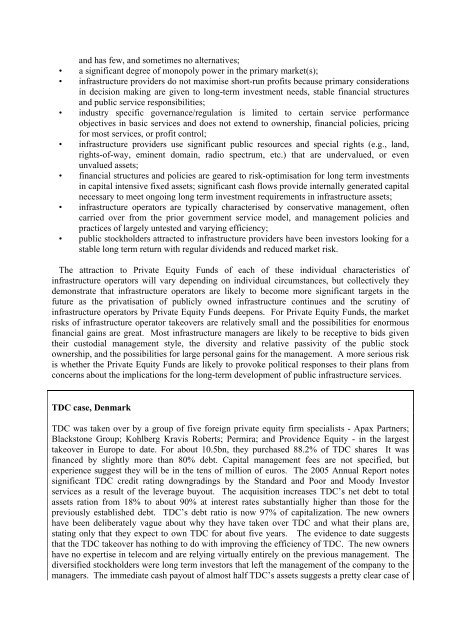Executive summary - Udo Bullmann
Executive summary - Udo Bullmann
Executive summary - Udo Bullmann
- No tags were found...
Create successful ePaper yourself
Turn your PDF publications into a flip-book with our unique Google optimized e-Paper software.
and has few, and sometimes no alternatives;• a significant degree of monopoly power in the primary market(s);• infrastructure providers do not maximise short-run profits because primary considerationsin decision making are given to long-term investment needs, stable financial structuresand public service responsibilities;• industry specific governance/regulation is limited to certain service performanceobjectives in basic services and does not extend to ownership, financial policies, pricingfor most services, or profit control;• infrastructure providers use significant public resources and special rights (e.g., land,rights-of-way, eminent domain, radio spectrum, etc.) that are undervalued, or evenunvalued assets;• financial structures and policies are geared to risk-optimisation for long term investmentsin capital intensive fixed assets; significant cash flows provide internally generated capitalnecessary to meet ongoing long term investment requirements in infrastructure assets;• infrastructure operators are typically characterised by conservative management, oftencarried over from the prior government service model, and management policies andpractices of largely untested and varying efficiency;• public stockholders attracted to infrastructure providers have been investors looking for astable long term return with regular dividends and reduced market risk.The attraction to Private Equity Funds of each of these individual characteristics ofinfrastructure operators will vary depending on individual circumstances, but collectively theydemonstrate that infrastructure operators are likely to become more significant targets in thefuture as the privatisation of publicly owned infrastructure continues and the scrutiny ofinfrastructure operators by Private Equity Funds deepens. For Private Equity Funds, the marketrisks of infrastructure operator takeovers are relatively small and the possibilities for enormousfinancial gains are great. Most infrastructure managers are likely to be receptive to bids giventheir custodial management style, the diversity and relative passivity of the public stockownership, and the possibilities for large personal gains for the management. A more serious riskis whether the Private Equity Funds are likely to provoke political responses to their plans fromconcerns about the implications for the long-term development of public infrastructure services.TDC case, DenmarkTDC was taken over by a group of five foreign private equity firm specialists - Apax Partners;Blackstone Group; Kohlberg Kravis Roberts; Permira; and Providence Equity - in the largesttakeover in Europe to date. For about 10.5bn, they purchased 88.2% of TDC shares It wasfinanced by slightly more than 80% debt. Capital management fees are not specified, butexperience suggest they will be in the tens of million of euros. The 2005 Annual Report notessignificant TDC credit rating downgradings by the Standard and Poor and Moody Investorservices as a result of the leverage buyout. The acquisition increases TDC’s net debt to totalassets ration from 18% to about 90% at interest rates substantially higher than those for thepreviously established debt. TDC’s debt ratio is now 97% of capitalization. The new ownershave been deliberately vague about why they have taken over TDC and what their plans are,stating only that they expect to own TDC for about five years. The evidence to date suggeststhat the TDC takeover has nothing to do with improving the efficiency of TDC. The new ownershave no expertise in telecom and are relying virtually entirely on the previous management. Thediversified stockholders were long term investors that left the management of the company to themanagers. The immediate cash payout of almost half TDC’s assets suggests a pretty clear case of





